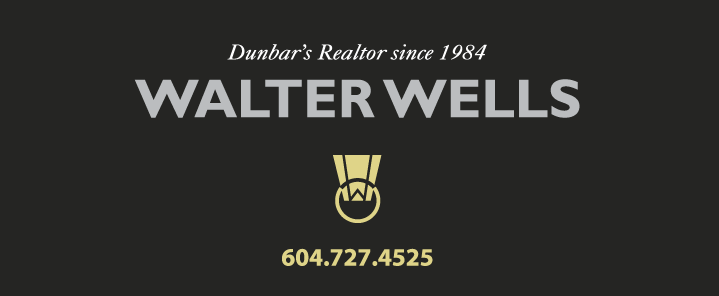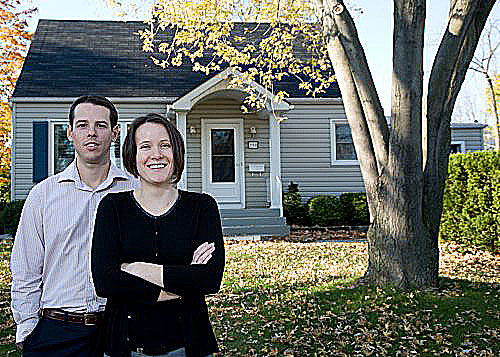VANCOUVER -- To be young and hopeful of buying a first home in Toronto or Vancouver is kind of like trying to win the heavyweight title at 115 pounds - the odds are against you and, no matter what, you are going to get hit hard.
To be a successful contender, against the backdrop of skyrocketing prices, increased land-transfer taxes and stiff competition, young home buyers need dedication, patience and significant resources.
So how do buyers navigate the country's harshest housing markets? What follows is the story of how two couples - one in Toronto and one in Vancouver - found their dream homes.
In most central neighbourhoods in Toronto or Vancouver, the cost of a single-family home is now over $500,000. Sure, the condo markets in both cities do offer a small selection at below that mark, but what if you want a house, a yard or more than 600 square feet of living space?
With dual professional incomes and a large nest egg (personal savings and borrowed money), Hilary and Brad Mack began their search for a home in Toronto in October, 2006, after years of renting in the city.
In Vancouver, Dominic Zamprogna and Linda Leslie, who purchased a loft condominium in 2003 for $214,000 and sold it this spring for $410,000, had hopes of buying a detached home.
Both couples entered the market with a thorough knowledge of their city's current market conditions, where "starter" houses often sell for up to $100,000 over the list price and multiple offers are the norm.
"We knew going in that the list price was never going to be the bidding price, but I didn't know that people were purposely underlisting to drive up the amount of offers and the price," says Mrs. Mack. "Lots of people list their house at a price for which they would not even consider selling it. It was a bit nerve wracking at first and somewhat surprising, but we were warned."
In both cities, houses generally sell quickly, says Walter Wells, an agent for Sutton West Coast Realty in Vancouver.
"It can be kind of intimidating for any buyer, but especially first-time buyers who sometimes feel that after viewing a $500,000 shack for 15 minutes, they are forced to make an instant decision and compete with 10 other buyers on a house, the colour of which they're not sure they remember," he says.
But the biggest disillusionment for first-time buyers stems from what they think they can afford and what they can actually afford, says Geeske Cruickshank, an agent for Royal LePage Real Estate Services Ltd. in Toronto.
"We set a price cap of about $550,000, hoping to get something for around $500,000," Mr. Zamprogna says. "I guess I was dreaming, because apparently, in Vancouver, $500,000 gets you a former grow-op in a crappy neighbourhood."
After looking at numerous homes between $500,000 and $700,000, Mr. Zamprogna had a new revelation. "A one-million-dollar home in Van looks like what I would expect for half, and a half-million dollar home looks like a quarter-million at best."
"Most buyers will look at 10 to 15 homes before they really know what their priorities are," Ms. Cruickshank says. "First-time buyers will spend several months pouring over listings in newspapers, looking at listings online, and going to open houses," Mr. Wells adds.
For Mr. Zamprogna, this process became routine. "I was on MLS every day with my morning coffee, scanning pages and pages of houses in various areas of Vancouver's east side," he says. "Then we'd just get in the car on the weekends and crash open houses all over the place."
After six months of viewing homes, the Macks had settled on a few areas (where they could afford to live, not necessarily where they had wanted to live), made a list of "must haves" and were ready to make their first offer.
"We bid on a house north of the Danforth ... that was listed at $389, 000," says Mrs. Mack. "We had the home inspection done (at a cost of $400) and it was in good shape. There were five offers. We bid $425,000. The house sold for $445,000. It was a semi-detached with a "basement apartment" that was really poorly done. It had a tiny kitchen and the smallest backyard you have ever seen. The lot was probably 16 by 90 feet."
At this time Mr. Zamprogna and Ms. Leslie were also ready to bid. "It was a big house in great condition, listed at $599,000, which was a relatively good deal for the space (more than 2,000 square feet) and location (Trout Lake on Vancouver's east side)," says Mr. Zamprogna. "Its only issue was that the city had come down on the owners because they had four illegal suites inside. The home's purchasers would have to deal with permits and eliminating the unauthorized accommodations. We were willing to do all that, so we went in at asking. It was our max. It had multiple offers and sold within a week for $60,000 above asking."
The Macks viewed more than 100 homes and made four offers. Each time they were outbid and conceded to bigger compromises. They gave up looking at three-bedroom homes and made an offer on a two-bedroom, they searched further east and even sacrificed items from their "must haves."
"We started looking at two-bedroom houses - against our better judgment - and occasionally contemplated buying a house without parking, even though that was on our original 'must have' list," says Mrs. Mack. "Things that were important - back yards, parking spaces, a workable kitchen - were harder to find than I had imagined," she adds.
Mr. Zamprogna and Ms. Leslie viewed over 25 homes in three months and made six offers. "We were constantly outbid. It got to the point that we wouldn't bother wasting the time to write it up if there were more than two offers coming in," says Mr. Zamprogna.
In Vancouver, high prices are driving people who are looking for their first home into the Lower Mainland suburbs, says Mr. Wells. "Most first-time buyers will keep expanding their search further and further outside of the city until they get a suitable home. In the end it often means buying in the suburbs with a commute time of two to four hours daily," he says.
First-time buyers in Toronto also make compromises, says Ms. Cruickshank. "Most buyers have such a strong desire to stay in the central core that they will undertake a home that needs a new kitchen or bathroom renovation, or widen their parameter as to location, or give up outdoor space, an extra bedroom or parking," she says.
Contrary to these trends, the Macks felt driven to look beyond the 416 boundary and bought a three-bedroom home in Oakville, , while Mr. Zamprogna and Ms. Leslie found a three-bedroom fixer-upper within the city limits.
"We saw our house in July, made an offer of $450,000 (it was listed for $479,000) and bought it for $455, 000," says Mrs. Mack. After the frustrations and disappointments of their Toronto search, the Macks have happily compromised a 30-minute commute for a detached home, garden, yard and private drive.
"It has two bathrooms, an unfinished basement and room for a baby grand piano," says Mrs. Mack. (Not to mention a baby Mack, whose arrival is expected this April.) For Mr. Zamprogna and Ms. Leslie, a city address was a must. "We knew we would be in for a fixer-upper," he says. "Then, one fine day in June, we came across our house. It was going for $599,000 and we got it for $585,000. It needs a lot of work but it's coming together with help from our families. We have a huge fig tree in the backyard and a view of the North Shore Mountains. And in our opinion it sits on the prettiest street in the east side."
The Macks recommend the traditional scout motto: "Be prepared', "to spend more than you want to without getting carried away. Pick a limit and stick to it," says Mrs. Mack.
Mr. Zamprogna believes that resilience is the key. "Look everyday at houses, condos. ... Go and see as many as you can handle before putting in an offer."
Mrs. Cruikshank and Mr. Wells both advise in favour of certified cheques and home inspections. "The closer you can get to making an all-cash, no-subject offer is so important when you are competing with other eager buyers." Mr. Wells says.
And, above all else, come out swinging.


